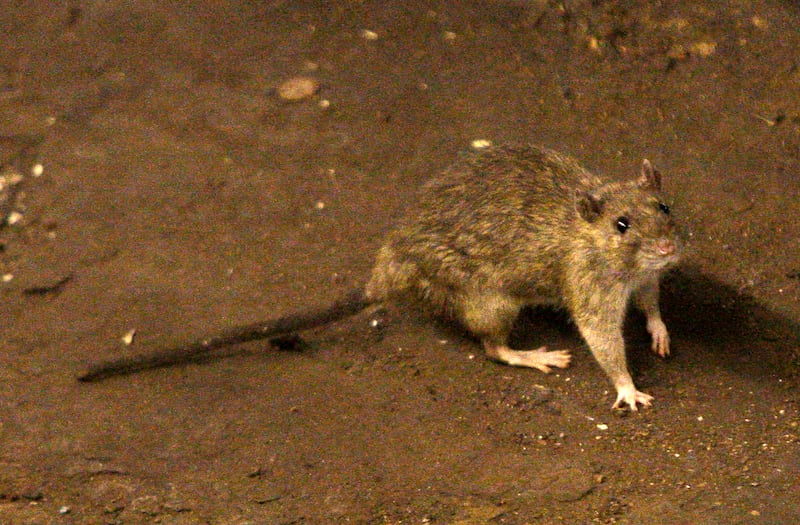- Hantavirus is relatively rare but can be lethal.
- The virus is found in rodent droppings, urine and saliva.
- There are specific steps to take to clean and be safe.
As the weather warms, rodents that may have been seeking warmth in your garage, sheds and tall grass are likely scampering out. But they could be leaving something very dangerous behind.
Utah public health officials sent a warning to the media Monday about the dangers of the virus, along with instructions for how to safely clean out sheds, garages, cabins and other locations where mice might be.
Hantaviruses — a family of viruses — can cause hantavirus pulmonary syndrome and hemorrhagic fever with kidney syndrome, according to the Centers for Disease Control and Prevention.
Those two potentially serious illnesses can be deadly. And they’re caused by inhaling droppings, saliva or urine from infected rodents.
Betsy Arakawa is one of the best known cases of hantavirus; she died around Feb. 11 at the home she shared with husband Gene Hackman in Santa Fe, New Mexico. Her cause of death was determined to be hantavirus pulmonary syndrome. For those who get the respiratory symptoms, an estimated 38% die.
Deer mice are the rodents most apt to spread the syndrome in the U.S.
Very serious illness
The CDC said symptoms start from one to eight weeks after someone comes in contact with infected rodent residues.
The early symptoms are somewhat flu-like, including fatigue, fever and muscle aches. Roughly half of those infected also get headaches, dizziness, chills and digestive issues like nausea, vomiting, diarrhea and abdominal pain.
Between four and 10 days after that, those people may experience coughing and shortness of breath.
While hemorrhagic fever with renal syndrome from hantavirus is a much less common form of hantavirus than the lung-attacking version in the U.S. and is not usually found here, there is a version called Seoul hantavirus that circulates here.
The sometimes deadly disease is severe and affects the kidneys. Symptoms develop a week or two after exposure, though occasionally it can take up to eight weeks.
Initial symptoms are intense headaches, back and abdominal pain, fever, chills, nausea and blurred vision. The CDC said people may have flushing of the face, eye inflammation or redness or a rash.
Later symptoms include low blood pressure, lack of blood flow, internal bleeding and acute kidney failure, leading to severe fluid overload.
The CDC said recovery takes weeks to months.

Utah health warning
Cleaning those outdoor buildings takes some serious thought, because casual sweeping could stir up the virus-infected droppings, allowing people to breathe in particles. You can also be infected by a rodent bite and touching food or objects that have been contaminated by an infected rodent.
“Anyone who comes in contact with rodents that carry the virus is at risk,” according to Kacy Nowak, Utah Department of Health and Human Services epidemiologist.
Make sure you take precautions when you work in areas with potential rodent droppings and nests. Use a disinfectant spray on areas with droppings and wait 15-20 minutes before you clean. This will kill the virus and decrease your risk,” she said.
Besides cleaning areas with potential viral infection, the department warned of work-related exposures and encountering the virus during outdoor activities like camping and hiking.
Per the health department’s notice, “Although rare, hantavirus is fatal in about 60% of cases reported. Anyone who experiences early symptoms such as fatigue, fever, muscle aches and shortness of breath and has a history of rodent exposure should contact their health care provider immediately.”
Cleaning safely
Utah health officials say to follow these steps to prevent hantavirus:
- Air out closed-up buildings before you begin.
- Trap mice until you get them all.
- Clean up nests and droppings with a disinfectant (steps below).
- Do not sweep up droppings, as they can be stirred into the air and inhaled.
- Keep places where rodents nest, like hay, wood and compost, far away from your home.
- Eliminate junk piles.
- Don’t leave animal food and water where mice can indulge.
- Seal the holes inside and outside of your home.
Cleaning steps:
- Put on rubber or plastic gloves.
- Spray droppings, urine and nests with bleach solution or an EPA-registered disinfectant until it’s very wet and let it soak for five minutes or the time listed on disinfectant labels.
- Use paper towels to wipe it up, then throw them in a covered garbage can that is emptied often.
- Mop up the area with disinfectant, including cleaning all hard surfaces and the floor.
- Take off the gloves and wash your hands thoroughly with soap and water.
More information is available at http://epi.health.utah.gov/epi/diseases/hantavirus/.


